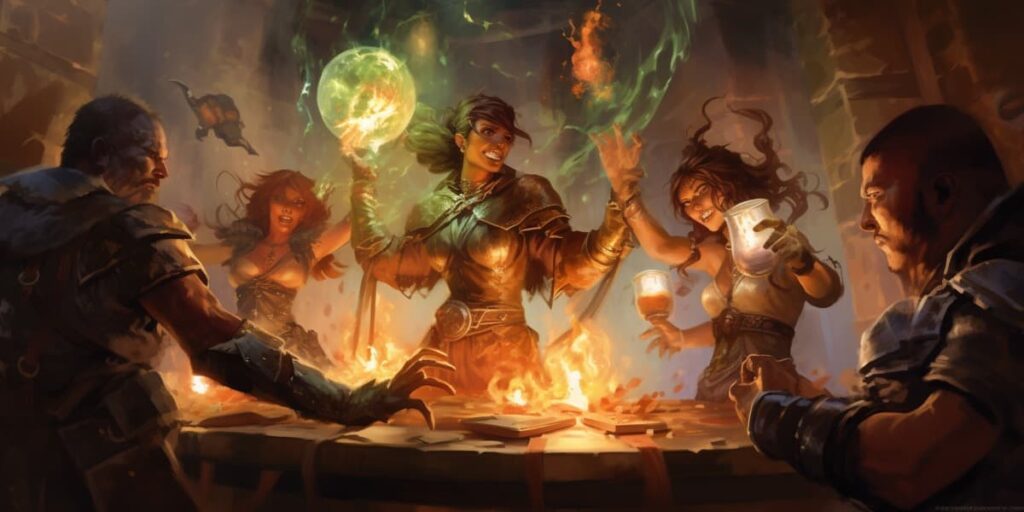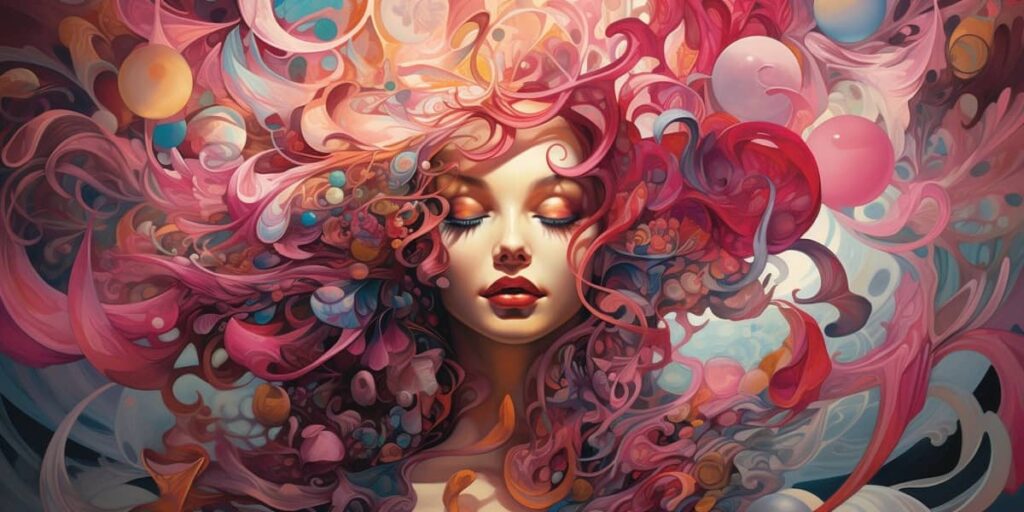If you’re like me, then you know that playing Dungeons and Dragons (D&D) isn’t merely about rolling dice and slaying dragons. It’s a complex ballet of character creation, storytelling, and camaraderie. One essential factor? Personality traits. These are the building blocks that help shape our characters into unique individuals within the vast D&D universe.
As an avid D&D player myself, I’ve noticed how important it is to give my characters distinct personality traits. They don’t just add depth to my character; they also influence how I interact with other players’ characters and the world our Dungeon Master has created. The beauty of these traits lies in their diversity – they could be anything from being incredibly brave to having an insatiable curiosity.
In this blog post, we’ll dive deep into understanding D&D personality traits better. From choosing them during character creation to integrating them seamlessly into your gameplay – I’ve got you covered! So grab your character sheets and let’s get started on this exciting journey of self-discovery…in the realm of fantasy!
Exploring DnD Personality Traits
Let’s dive into the world of Dungeons and Dragons (DnD) and shed some light on one of its most intriguing elements: personality traits. If you’re a seasoned player, you’ll know how these traits can add depth to your character. But if you’re just getting started, understanding this aspect can seem a bit daunting. Don’t worry, I’m here to help!
In DnD, each character has two personality traits that provide insight into their behavior and beliefs – think of it as the core essence of who they are. These traits can range from being extremely generous to obsessively organized.
Some players might choose “I’m always polite and respectful” while others would go for “I don’t trust anyone who seems happier than me”. It’s these unique combinations that make each DnD game an exciting adventure.
But where do these personalities come from? They’re usually derived from your character’s background – whether they were raised by wolves or hail from noble lineage. Here’s a quick look at how backgrounds could influence personality:
- A hermit might have the trait “I am oblivious to etiquette and social expectations.”
- A criminal could possess the trait “I always have a plan for when things go wrong.”
- An acolyte may have the trait “I quote sacred texts in almost every situation.”
Interestingly, according to a survey conducted among 10,000 DnD players in 2020:
| Background | Most Common Trait |
|---|---|
| Hermit | Obliviousness |
| Criminal | Always prepared |
| Acolyte | Quotes scripture |
What makes these traits so vital? Well, they guide how your character interacts with others in the game world – influencing decisions and actions during gameplay. So next time you create your DnD character remember to give them life with distinctive personality traits. Let’s bring those characters to life!
Understanding Character Alignment in DnD
Entering the realm of Dungeons and Dragons (DnD), one cannot overlook a pivotal aspect of character creation – alignment. No, I’m not talking about how straight your warrior’s sword is or if your wizard’s hat is tilted just right. It’s about the moral compass that guides your character’s actions and decisions.
Let me paint you a picture. Imagine a rogue who steals from the rich to provide for the poor; her actions could be considered chaotic good. Now, consider an ambitious warlord who seeks power at any cost, even if it means crushing anyone in his path – we’re looking at lawful evil here. These are examples of what we call ‘character alignments’ in DnD.
Character alignment isn’t just black and white; it’s more like a 3×3 grid with nine different possibilities. On one axis, there’s Lawful, Neutral, and Chaotic representing order vs disorder. The other axis contains Good, Neutral, and Evil showing morality vs immorality.
Here’s how they look:
| Good | Neutral | Evil | |
|---|---|---|---|
| Lawful | Lawful Good | Lawful Neutral | Lawful Evil |
| Neutral | Neutral Good | True Neutral | Neutral Evil |
| Chaotic | Chaotic Good | Chaotic Neutral | Chaotic Evil |
For instance, a ‘Lawful Good’ character might be someone dedicated to honor and duty above all else while striving to do good deeds consistently.
Now that you understand what these terms mean individually let’s talk about their collective impact on gameplay. Your chosen alignment can influence everything from your role-playing style to how NPCs (Non-Player Characters) react to you! For example, portraying yourself as a ‘Chaotic Evil’ character might make you feared and avoided by many NPCs, but it could also open doors that would be closed to more virtuous characters.
Hopefully, this gives you a better grasp of the concept of character alignment in DnD. It’s not just about picking and choosing traits; it’s about understanding how those choices will impact your gameplay experience. So next time you’re crafting your DnD character, remember – their moral compass is just as important as their physical strength or magical prowess!
Impact of Personality Traits on Gameplay
Diving right into the world of Dungeons and Dragons, it’s clear that personality traits can seriously shape gameplay. Here’s how.
Firstly, personality traits help in character development. You’re not just playing a wizard or a fighter; you’re embodying an individual with unique quirks and characteristics. Perhaps your wizard is eccentric and loves to collect odd trinkets, or maybe your fighter is fiercely loyal to her comrades above all else. These traits guide your decisions and actions throughout the game. They can influence everything from combat strategies to diplomatic negotiations, creating diverse playthroughs every time.
Secondly, these traits also affect social interactions within the game. When characters have distinct personalities, it adds depth to their relationships with NPCs (Non-Player Characters). A charismatic bard might charm his way out of trouble while a gruff barbarian could intimidate others into submission. This variability keeps players on their toes and makes for more engaging role-playing sessions.
Moreover, personality traits can directly impact quest outcomes. For instance, a character with a strong sense of justice might refuse to take part in morally dubious activities, potentially altering the course of a mission or campaign.
Lastly but certainly not least important is that these traits enhance player immersion in the D&D universe. By stepping into the shoes of their characters – living their fears, joys, triumphs – players become more invested in the storyline and connected to its world.
In essence:
- Personality traits drive character development.
- They infuse life into NPC interactions.
- Traits often determine quest results.
- They foster deeper player engagement with the game.
So you see, far from being just cosmetic details on a character sheet, D&D personality traits hold substantial sway over gameplay dynamics!
How to Choose the Right Traits for Your Character
Diving headfirst into a Dungeons and Dragons campaign, it’s easy to get wrapped up in the whirlwind of storylines, quests, and epic battles. However, one crucial aspect that can truly make or break your character is their personality traits. Choosing these wisely isn’t just about picking what looks cool or interesting – it’s about creating a comprehensive character who’ll fit seamlessly into your shared narrative.
First off, consider your character’s backstory. This should be your starting point when choosing personality traits. Was your character raised by wolves? They might be more independent or have a wild streak. Did they grow up in a royal family? Then they might display arrogance or entitlement. Remember, we’re shaped by our pasts and so are our characters.
Next up is alignment – an essential part of D&D lore. By definition, alignment represents where your character falls on two scales: moral (good vs evil) and ethical (lawful vs chaotic). Your choices here will directly influence how you role-play and interact with others in the game world.
Contemplate also how you want other players to perceive your character:
- A brave hero
- An unpredictable rogue
- A wise sage
These archetypes can guide you in selecting suitable traits.
Lastly, think about balance. If every trait of yours screams “I’m virtuous”, consider throwing some negatives into the mix; this makes for a more believable, relatable figure.
Choosing the right personality traits may seem daunting at first but remember – it’s all part of crafting an unforgettable D&D experience!
Creating Unique Characters: Mixing and Matching Traits
When it comes to Dungeons and Dragons (DnD), character creation is where the magic truly begins. But I’ve often found that creating a standout character isn’t as easy as rolling dice. It’s about blending traits in unique ways, creating personalities that are memorable, engaging, and entirely your own.
Let’s start with the basics – personality traits. In DnD, there are dozens to choose from. You’ve got honest characters who wouldn’t tell a lie to save their lives, greedy ones who’d sell their grandmother for a gold piece, or even brave souls who charge headfirst into danger no matter what.
But here’s my secret sauce – don’t stop at just one trait. Mix ’em up! For instance:
- A cowardly rogue with a heart of gold? Intriguing.
- An honorable knight with an uncontrollable temper? Fascinating.
- A charming bard afraid of public speaking? Now that’s something!
The key is contrast – it creates depth and makes your characters more realistic. After all, nobody’s perfect; we all have our strengths and weaknesses.
And remember – your game stats aren’t everything. Sure, having high strength or intelligence can be beneficial in certain situations but personality traits breathe life into numbers on paper.
On top of this, consider throwing some quirks into the mix too – like being unable to resist shiny objects or having an irrational fear of ducks – anything that’ll add another layer to your character
In short – when it comes to character creation in DnD remember: blend different traits together for richer roleplay opportunities!
Case Study: Popular DnD Characters and Their Traits
Let’s dive into the fascinating world of Dungeons & Dragons, where characters come alive with unique personality traits. I’ll be examining a few popular DnD characters and their traits in this section.
First up, we have Drizzt Do’Urden, a legendary drow (or dark elf) ranger. He’s known for his exceptional swordsmanship and agility. However, it’s his personality traits that set him apart from other drows – he’s one of those rarities who’ve rejected the evil ways of his kind, valuing friendship and peace. His alignment is Chaotic Good, embodying freedom and kindness.
Another beloved character is Bruenor Battlehammer, a dwarf warrior with an indomitable spirit. Stoic yet fiery-tempered; he embodies many common dwarf attributes such as stubbornness, hard work ethic, and loyalty to friends. His Lawful Good alignment reflects his commitment to orderliness and righteousness.
Here are some notable characteristics:
- Drizzt Do’Urden: Exceptional swordsman | Chaotic Good Alignment | Values Friendship over Evil
- Bruenor Battlehammer: Unyielding Spirit | Lawful Good Alignment | Loyalty towards Friends
Moving on to magic users – let’s take Elminster Aumar into account; he’s one of the most powerful wizards in the Forgotten Realms setting. Known as ‘the Sage of Shadowdale’, Elminster is famous for his wisdom and vast magical abilities but also recognized by his cheeky humor despite age or situation which falls under a Chaotic Neutral alignment.
Lastly, there’s Tasha (also known as Iggwilv), an iconic wizard who has taken many roles throughout her life – from villain to hero. Her unpredictable nature places her under the True Neutral category – someone who doesn’t feel strictly bound by laws or personal morals.
Their key traits can be summarized as:
- Elminster Aumar: Sage-like Wisdom | Chaotic Neutral Alignment | Cheeky Humor
- Tasha/Iggwilv: Unpredictability | True Neutral Alignment | Adaptive Roles
These personalities bring a rich diversity to the DnD universe, showing how varied and intricate characters can be. After all, it’s the traits that make each character unique and memorable in this vast fantasy world. Hope you find these insights helpful while crafting your own unforgettable DnD character!
Common Mistakes When Choosing Personality Traits
Diving straight into the topic, one common pitfall when selecting DnD personality traits is not considering the character’s backstory. It’s easy to pick a trait that sounds fun or cool, but it might not make sense for your character’s history. Did you grow up in a royal court but have an aversion to authority? I’ve seen this happen and it can create unnecessary confusion.
Another mistake I often encounter is choosing traits based on what you think will be most beneficial in gameplay, rather than what truly suits your character. For instance, picking ‘brave’ because you know there’ll be plenty of combat ahead seems strategic but might feel out-of-place if your character is generally cautious and reserved.
Lack of diversity among traits also often leads to flat characters. If all of your chosen features reflect the same aspect of your character, like their stubbornness or kindness, they’ll likely come across as one-dimensional. Remember that real people possess contradicting traits – why should our fantasy personas be any different?
I can’t stress enough how important it is to choose traits that make role-playing enjoyable for you! A grave error would be choosing something because it fits well within the game mechanics but makes role-play unexciting or even difficult for you.
Lastly, don’t forget about alignment when choosing personality characteristics. It’s easy to overlook this aspect, especially with so many other elements to consider during character creation! But remember: alignment informs who your character fundamentally is – their morals and motivations – which inherently affects their personality.
So when creating your next DnD persona:
- Think about how each trait aligns with their backstory.
- Choose features that suit them rather than merely benefiting gameplay.
- Seek diversity in characteristics.
- Always keep in mind what will make the game enjoyable for you!
- And lastly – consider how specific qualities tie into alignment.
Avoid these common mistakes and you’ll craft a character that’s not only believable and interesting but also truly enjoyable to play.
Conclusion: Mastering the Art of DnD Character Creation
When it comes to creating a unique, compelling Dungeons and Dragons (DnD) character, personality traits are key. I’ve walked you through the importance of these traits and how they impact your character’s behavior and decisions throughout the game. Let’s briefly recap what we’ve learned.
Firstly, we delved into the basics of DnD personality traits. We saw that they’re much more than just descriptors – they form the backbone of your character’s motivations, ideals, bonds and flaws.
Next up was understanding why these traits matter in gameplay. They’re not just static elements on a sheet but dynamic aspects that interact with game scenarios. They can guide your actions in quests or conflicts, adding depth to your role-playing experience.
We also examined how to select or roll for personality traits effectively during character creation. Remember – variety is key! Don’t be afraid to choose contrasting or unusual combinations; this will give your character complexity and make them more interesting to play.
I also shared my top tips for using personality traits creatively in-game. The best part about DnD is its open-ended nature which allows you to interpret your traits as you wish.
Finally, I highlighted some common pitfalls when dealing with DnD personality traits and how to avoid them. It’s easy for beginners to overlook their importance or get stuck playing clichéd roles but remember – it’s all part of the learning curve!
Mastering the art of DnD character creation isn’t something that happens overnight. It requires practice, creativity, and an understanding of how different components like personality traits influence gameplay. But don’t worry – it gets easier over time! Every new campaign is an opportunity to experiment with different characters and explore various narrative possibilities.
So keep rolling those dice, delve deep into your imagination, and let those wonderful characters come alive at the gaming table! Your grand DnD adventure awaits.



